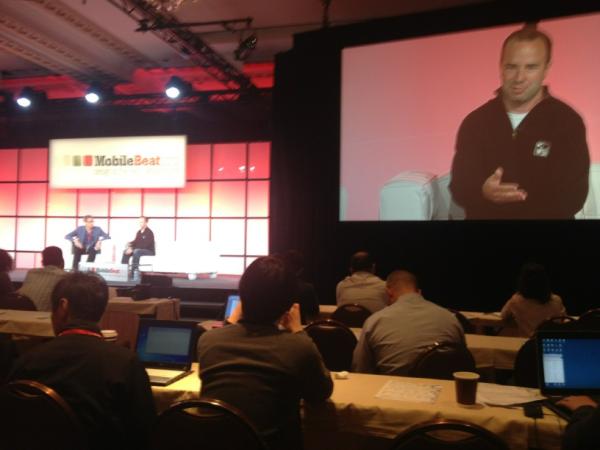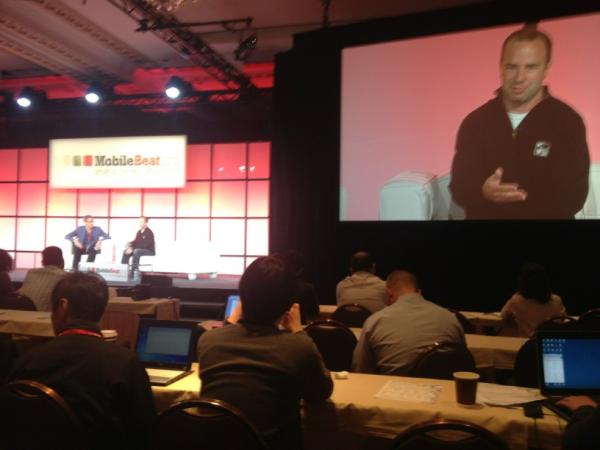This sponsored post is produced by Rob Weber, Co-Founder of W3i.
At the recent MobileBeat/GamesBeat conference in San Francisco, I was interviewed on stage by Matt Marshall, VentureBeat’s Founder & Editor-In-Chief on the topic of designing apps for monetization.
The problem most app developers have is that they overly focus their initial design efforts on engagement and retention rather than monetization. Most developers believe that once they launch a highly engaging mobile app, they’ll get around to optimizing for monetization. The problem is that most apps achieve their peak traffic levels within the first three to six months of launch. By the time they get around to optimizing monetization, they already blew past their peak traffic levels and are declining quickly.
The solution is to focus on designing for monetization upfront. Here are three specific examples of high impact tactics you can implement during design:
- Integrated Interfaces for In-App Purchases/Offers – At W3i, one area in which we go above and beyond for our app partners to help them grow their business, is in optimizing their interfaces for in-app purchases and offers. Specifically, we see custom interfaces more than double generic interfaces that other monetization platforms typically utilize.
- Explain What an In-App Purchase Upgrade Does – One mistake we see commonly made by developers is that they do not sufficiently explain how an in-app purchase upgrade will create value for the user’s experience. Better to excessively explain to a user what an in-app purchase upgrade does for them rather than to leave them in the dark.
- Up Sell At the Right Time – Coordinate the offer with natural opportunities within the game. For example, when the user is playing your battle game and loses a battle, display a better weapon at the level recap screen that could help them win the battle.
How do you know if your game is monetizing well? Let’s look at three different perspectives:
- Percentage of Paying Users Each Day – In partnership with W3i, Kontagent recently analyzed the behavior of 2 million unique users across 19 different apps from March to June and found that the range of paying users on any given day was from approximately 0.02% (two one hundredths of one percent) to 0.1% (one tenth of one percent).
- ARPDAU Benchmarks – Across W3i’s network of 13.7 million daily active users, Average Revenue Per Daily Active User (ARPDAU) typically falls within the $0.05 to $0.25 range for the more successful casual/mass market iOS games, with about 40% of their revenue (on average) coming from offer-based monetization provided by W3i. The balance of monetization coming from cash transactions.
- ARPDAU for the Highest Grossing Apps – Neil Young, CEO/founder of ngmoco, which is now owned by DeNA, recently reported that in their Rage of Bahamut game, which is consistently among the highest grossing titles in the U.S., they are generating as much as $0.60 to $1.50 ARPDAU. Before you race out and design your own strategy/RPG game, you may want to consider the massive amount of advertising being invested by DeNA/ngmoco, Gree, and others. As Gabe Leydon, CEO/founder of Machine Zone, stated during a recent panel I spoke on, we are just seeing the beginning of pressures on user acquisition in the strategy/RPG world as we have yet to see the impact of the largest game companies, like Tencent, launch in North America. Expect the costs to acquire users to continue to go up over the next 5-10 years as the land grab continues. Small- to medium-sized game developers should think about becoming ad suppliers and creating casual/mass market apps which showcase strategy/RPG apps.
Be proactive when in the planning stage to determine how you are going to monetize your game. Basically the more integrated the monetization, the higher the conversion and the less invasive the ads so as not to deter retention. Successful apps figure out this delicate balance.
VentureBeat's mission is to be a digital town square for technical decision-makers to gain knowledge about transformative enterprise technology and transact. Learn More


